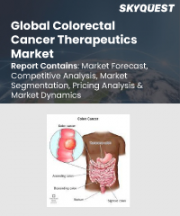
|
시장보고서
상품코드
1535649
대장암 치료제 시장 규모 : 치료별, 암 유형별, 치료 제공자별, 예측(2024-2032년)Colorectal Cancer Therapeutics Market Size - By Therapy (Immunotherapy, Chemotherapy), Cancer Type (Colorectal Adenocarcinoma, Gastrointestinal Carcinoid Tumors), Treatment Provider (Hospitals, Specialty Clinics) & Forecast, 2024 - 2032 |
||||||
세계의 대장암 치료제 시장은 이 분야의 연구개발 노력의 증가에 의해 촉진되며, 2024-2032년 4.6% 이상의 CAGR을 기록합니다.
대장암은 여전히 전 세계 암 관련 사망의 주요 원인으로 효과적인 치료법 개발이 시급한 상황입니다. 제약회사와 연구기관들은 표적치료제, 면역치료제, 개인맞춤형 의료 접근법 등 새로운 치료법 개발에 많은 투자를 하고 있습니다.
예를 들어 2024년 7월에는 새로운 약물 조합이 기존과는 다른 방식으로 종양을 억제할 수 있는 가능성을 보여주었습니다. 이 전략은 표준 치료에서 강조하는 종양 세포의 분열을 억제하는 대신 종양 세포내 발암성 신호 전달을 증가시켜 스트레스를 유발하는 방식입니다. 이 혁신적인 접근법은 네덜란드의 대장암 환자들을 대상으로 테스트될 예정입니다.
또한 대장암의 근본적인 유전적, 분자적 메커니즘이 밝혀지면서 혁신적인 치료법의 길이 열리고 있습니다. 암 연구에 대한 정부의 구상과 자금 지원도 이러한 발전을 가속화하는 데 중요한 역할을 하고 있습니다. 그 결과, 대장암 치료제 시장은 환자의 생존율과 삶의 질을 향상시킬 수 있는 보다 효과적이고 표적화된 맞춤형 치료 옵션을 기대할 수 있게 됨에 따라 큰 성장을 이룰 것으로 예상됩니다.
치료법별로 보면 화학요법 부문의 대장암 치료제 시장 점유율은 2024-2032년 연평균 성장률(CAGR)이 두드러질 것으로 예상됩니다. 표적치료제와 면역치료제의 발전에도 불구하고, 화학요법은 빠르게 분열하는 암세포를 표적으로 삼는 효과로 인해 대장암 관리의 핵심으로 남아있습니다. 특히 다른 치료법과 병용하여 다양한 병기에 대응할 수 있으므로 그 중요성은 지속되고 있습니다. 효과적인 화학요법에 대한 지속적인 요구는 새로운 약물 제제 및 약물전달 방법의 개선에 대한 수요를 주도하고 있습니다. 연구가 진행됨에 따라 화학요법과 새로운 치료법의 통합은 환자의 예후를 개선하고 대장암 치료제 시장의 지속적인 성장을 목표로 하고 있습니다.
암 유형별로는 소화관 카르티노이드 종양 분야가 2024-2032년 괄목할 만한 성장을 보일 것으로 예상됩니다. 이러한 종양은 드물지만 독특한 치료 과제를 가지고 있으며, 전문적인 치료 옵션에 대한 수요를 주도하고 있습니다. 카르티노이드 종양의 명확한 생물학적 기전을 표적으로 하는 혁신적인 치료법은 환자 예후를 개선하는 데 필수적입니다. 펩티드 수용체 방사성 핵종 요법(PRRT)과 신경내분비종양 전용으로 설계된 표적 치료제의 발전이 견인차 역할을 하고 있습니다. 틈새 시장이지만 대장암 치료에서 중요한 역할을 하는 이 분야는 의료 서비스 프로바이더들이 이러한 복잡한 종양을 관리할 수 있는 효과적인 솔루션을 찾고 있으므로 시장 성장을 촉진하고 있습니다.
유럽의 대장암 치료제 시장은 2024-2032년 연평균 성장률(CAGR)이 두드러질 것으로 예상됩니다. 유럽의 고령화와 대장암 발병률 증가로 인해 효과적인 치료 옵션에 대한 수요가 증가하면서 시장 성장에 박차를 가하고 있습니다. 이 지역의 탄탄한 의료 인프라는 표적치료, 면역요법, 맞춤의료 등 혁신적인 치료법의 채택을 지원하고 있습니다. 또한 연구개발에 대한 막대한 투자와 정부의 재정적 지원, 규제 당국의 지원은 새로운 치료 옵션의 제공을 가속화하고 있습니다. 유럽 국가들이 환자의 예후와 생존율을 개선하기 위해 노력하면서 첨단 대장암 치료에 대한 수요는 계속 증가하고 있습니다.
목차
제1장 조사 방법과 조사 범위
제2장 개요
제3장 업계 인사이트
- 에코시스템 분석
- 업계에 대한 영향요인
- 촉진요인
- 대장암의 이환율과 유병률의 증가
- 대장암 치료제의 기술적 진보
- 인지도의 향상과 조기 발견
- 업계의 잠재적 리스크 & 과제
- 치료에 수반하는 고비용과 부작용
- 촉진요인
- 성장 가능성 분석
- 파이프라인 분석
- 규제 상황
- Porter의 산업 분석
- PESTEL 분석
제4장 경쟁 구도
- 서론
- 기업 매트릭스 분석
- 기업 점유율 분석
- 주요 시장 기업의 경쟁 분석
- 경쟁 포지셔닝 매트릭스
- 전략 대시보드
제5장 시장 추산·예측 : 치료별, 2021-2032년
- 주요 동향
- 화학요법
- 면역치료
- 기타 요법
제6장 시장 추산·예측 : 암 유형별, 2021-2032년
- 주요 동향
- 대장선암
- 소화관 카르시노이드 종양
- 기타 암 유형
제7장 시장 추산·예측 : 치료 제공자별, 2021-2032년
- 주요 동향
- 병원
- 전문 클리닉
- 암연구기관
제8장 시장 추산·예측 : 지역별, 2021-2032년
- 주요 동향
- 북미
- 미국
- 캐나다
- 유럽
- 독일
- 영국
- 프랑스
- 스페인
- 이탈리아
- 네덜란드
- 기타 유럽
- 아시아태평양
- 중국
- 일본
- 인도
- 호주
- 한국
- 기타 아시아태평양
- 라틴아메리카
- 브라질
- 멕시코
- 기타 라틴아메리카
- 중동 및 아프리카
- 남아프리카공화국
- 사우디아라비아
- 아랍에미리트
- 기타 중동 및 아프리카
제9장 기업 개요
- Amgen Inc.
- Bayer AG
- Bristol-Myers Squibb Company
- Celleron Therapeutics
- Eli Lilly and Company
- F. Hoffmann-La Roche Ltd.
- Genentech, Inc.
- Novartis AG
- Pfizer Inc.
- Sanofi S.A.
- Sumitomo Pharma Co., Ltd.
- Regeneron Pharmaceuticals, Inc.
- TAIHO PHARMACEUTICAL CO., LTD
- Takeda Pharmaceutical Company Limited
- Teva Pharmaceutical Industries Ltd.
Global Colorectal Cancer Therapeutics Market will witness over 4.6% CAGR between 2024 and 2032, driven by rising research and development efforts in the field. As colorectal cancer remains a leading cause of cancer-related deaths globally, there is an urgent need for effective treatments. Pharmaceutical companies and research institutions are investing heavily in developing novel therapies, including targeted therapies, immunotherapies, and personalized medicine approaches.
For instance, in July 2024, a novel drug combination showed the potential to suppress tumors through an unconventional approach. Rather than inhibiting tumor cell division, which is the focus of most standard treatments, this strategy involved hyperactivating oncogenic signaling within the tumor cells to induce stress. This innovative approach was set to be tested in colorectal cancer patients in the Netherlands.
Additionally, the increasing understanding of the genetic and molecular mechanisms underlying colorectal cancer is paving the way for innovative treatments. Government initiatives and funding for cancer research are also playing a crucial role in accelerating these developments. As a result, the colorectal cancer therapeutics market is poised for significant growth, driven by the promise of more effective, targeted, and personalized treatment options that improve patient survival rates and quality of life.
The overall Colorectal Cancer Therapeutics Industry is classified based on the therapy, cancer type, treatment provider, and region.
Based on therapy, the colorectal cancer therapeutics market share from the chemotherapy segment will register a commendable CAGR from 2024 to 2032. Despite advancements in targeted and immunotherapy, chemotherapy remains a cornerstone in managing colorectal cancer due to its efficacy in targeting rapidly dividing cancer cells. Its ability to address various stages of the disease, especially when combined with other therapeutic modalities, ensures its ongoing relevance. The persistent need for effective chemotherapy regimens drives demand for new drug formulations and improved delivery methods. As research progresses, integrating chemotherapy with novel therapies aims to enhance patient outcomes and sustain market growth in colorectal cancer therapeutics.
In terms of cancer type, the gastrointestinal carcinoid tumors segment will witness appreciable growth from 2024 to 2032. These tumors, though rare, present unique treatment challenges that drive demand for specialized therapeutic options. Innovative therapies targeting the distinct biological mechanisms of carcinoid tumors are essential for improving patient outcomes. Advances in peptide receptor radionuclide therapy (PRRT) and targeted agents specifically designed for neuroendocrine tumors are gaining traction. This niche but critical area of colorectal cancer treatment is propelling market growth as healthcare providers seek effective solutions for managing these complex tumors.
Europe colorectal cancer therapeutics market will exhibit a notable CAGR from 2024 to 2032. Europe's aging population and increasing incidence of colorectal cancer necessitate effective treatment options, fueling market growth. The region's robust healthcare infrastructure supports the adoption of innovative therapies, including targeted treatments, immunotherapies, and personalized medicine. Additionally, significant investments in research and development, along with government funding and regulatory support, are accelerating the availability of new therapeutic options. As European countries strive to improve patient outcomes and survival rates, the demand for cutting-edge colorectal cancer therapies continues to expand.
Table of Contents
Chapter 1 Methodology & Scope
- 1.1 Market scope & definitions
- 1.2 Research design
- 1.2.1 Research approach
- 1.2.2 Data collection methods
- 1.3 Base estimates & calculations
- 1.3.1 Base year calculation
- 1.3.2 Key trends for market estimation
- 1.4 Forecast model
- 1.5 Primary research and validation
- 1.5.1 Primary sources
- 1.5.2 Data mining sources
Chapter 2 Executive Summary
- 2.1 Industry 360° synopsis
Chapter 3 Industry Insights
- 3.1 Industry ecosystem analysis
- 3.2 Industry impact forces
- 3.2.1 Growth drivers
- 3.2.1.1 Increasing incidence and prevalence of colorectal cancer
- 3.2.1.2 Technological advancements in colorectal cancer therapeutics
- 3.2.1.3 Increased awareness and early detection
- 3.2.2 Industry pitfalls & challenges
- 3.2.2.1 High cost and side effects associated with therapies
- 3.2.1 Growth drivers
- 3.3 Growth potential analysis
- 3.4 Pipeline analysis
- 3.5 Regulatory landscape
- 3.6 Porter's analysis
- 3.7 PESTEL analysis
Chapter 4 Competitive Landscape, 2023
- 4.1 Introduction
- 4.2 Company matrix analysis
- 4.3 Company market share analysis
- 4.4 Competitive analysis of major market players
- 4.5 Competitive positioning matrix
- 4.6 Strategy dashboard
Chapter 5 Market Estimates and Forecast, By Therapy, 2021 - 2032 ($ Mn)
- 5.1 Key trends
- 5.2 Chemotherapy
- 5.3 Immunotherapy
- 5.4 Other therapies
Chapter 6 Market Estimates and Forecast, By Cancer Type, 2021 - 2032 ($ Mn)
- 6.1 Key trends
- 6.2 Colorectal adenocarcinoma
- 6.3 Gastrointestinal carcinoid tumors
- 6.4 Other cancer types
Chapter 7 Market Estimates and Forecast, By Treatment Provider, 2021 - 2032 ($ Mn)
- 7.1 Key trends
- 7.2 Hospitals
- 7.3 Specialty clinics
- 7.4 Cancer research institutes
Chapter 8 Market Estimates and Forecast, By Region, 2021 - 2032 ($ Mn)
- 8.1 Key trends
- 8.2 North America
- 8.2.1 U.S.
- 8.2.2 Canada
- 8.3 Europe
- 8.3.1 Germany
- 8.3.2 UK
- 8.3.3 France
- 8.3.4 Spain
- 8.3.5 Italy
- 8.3.6 Netherlands
- 8.3.7 Rest of Europe
- 8.4 Asia Pacific
- 8.4.1 China
- 8.4.2 Japan
- 8.4.3 India
- 8.4.4 Australia
- 8.4.5 South Korea
- 8.4.6 Rest of Asia Pacific
- 8.5 Latin America
- 8.5.1 Brazil
- 8.5.2 Mexico
- 8.5.3 Rest of Latin America
- 8.6 Middle East and Africa
- 8.6.1 South Africa
- 8.6.2 Saudi Arabia
- 8.6.3 UAE
- 8.6.4 Rest of Middle East and Africa
Chapter 9 Company Profiles
- 9.1 Amgen Inc.
- 9.2 Bayer AG
- 9.3 Bristol-Myers Squibb Company
- 9.4 Celleron Therapeutics
- 9.5 Eli Lilly and Company
- 9.6 F. Hoffmann-La Roche Ltd.
- 9.7 Genentech, Inc.
- 9.8 Novartis AG
- 9.9 Pfizer Inc.
- 9.10 Sanofi S.A.
- 9.11 Sumitomo Pharma Co., Ltd.
- 9.12 Regeneron Pharmaceuticals, Inc.
- 9.13 TAIHO PHARMACEUTICAL CO., LTD
- 9.14 Takeda Pharmaceutical Company Limited
- 9.15 Teva Pharmaceutical Industries Ltd.



















